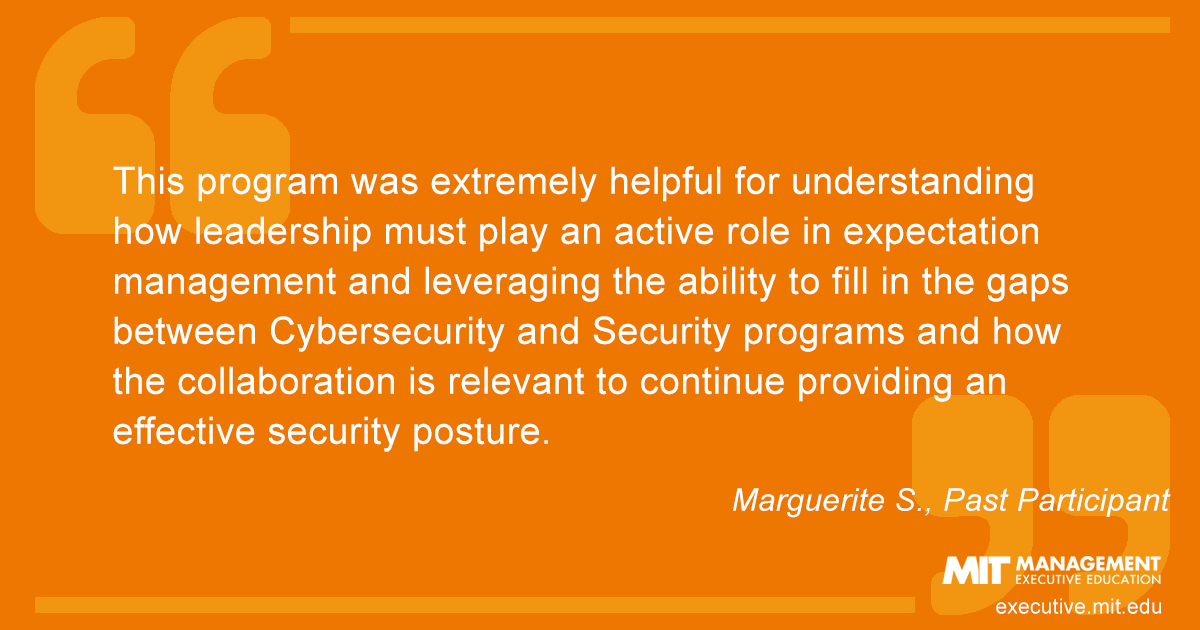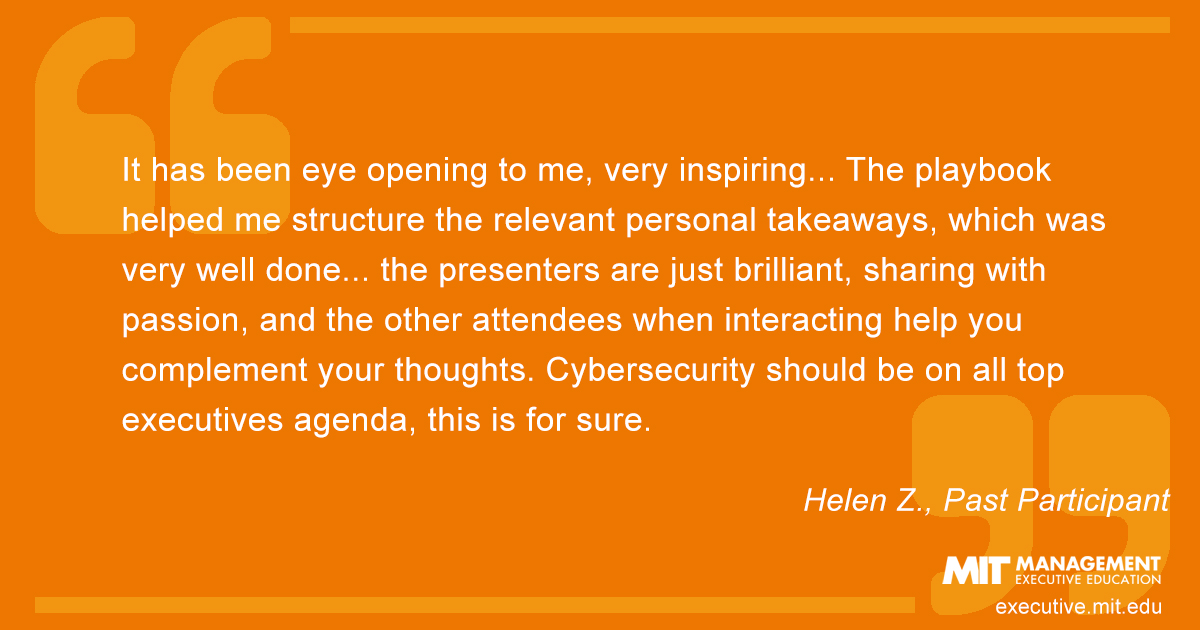Cybersecurity Leadership for Non-Technical Executives
Cybersecurity Leadership for Non-Technical Executives
| Course Dates | Format | Location | Duration | Time Commitment | Price |
|---|---|---|---|---|---|
| Nov 6-7, 2024 | In Person | Cambridge, MA | 2 days | 8 hours/day | $4,500 |
Tracks
Management and Leadership
Certificate Credits
2.0 EEUs
Topics
- Digital Business & IT
- Organizations & Leadership
- Strategy & Innovation
Course Highlights
- Delivered in our live-online format which enables real-time interaction with faculty and global peers
- Provides with a framework of managerial protocols to follow, resulting in a personalized playbook with actionable next steps towards creating a more cyber-aware culture within your organization
- Explains best practices for managing cybersecurity-related risk separate from the specialized IT infrastructure typically associated with this topic
- Confers a certificate of course completion from the MIT Sloan School of Management
Featured content
Why attend Cybersecurity Leadership for Non-Technical Executives?
Cyber risk and cybersecurity are a source of frustration for executives and government officials who spend inordinate time and worry trying to protect their data from sophisticated phishing schemes, ransomware, and state-sponsored hacking. However, cybersecurity issues are not purely a technology problem—they are multi-headed hydras that need to be addressed with a multi-disciplinary approach.
On the surface, a ransomware attack that effectively locks up your organization’s data is a technical one; but embedded within cyber risk and cybersecurity are a host of management problems as well.
This cybersecurity course is not intended to provide guidance on IT infrastructure or troubleshooting, rather it focuses on the humanistic and managerial aspects of cybersecurity. As a participant in this cyber security training course, you will be provided with a framework of managerial protocols to follow, resulting in a personalized playbook with actionable next steps towards creating a more cyber-aware culture within your organization.
Course experience
In today’s landscape of escalating cybercrime, mitigating cyber risk is not the Chief Information Security Officer’s responsibility alone—it is everyone’s job. Getting ahead of hackers and other security risks requires the active engagement of non-technical management, as well as an overall commitment to building a cybersecurity culture within your enterprise.
Cybersecurity Leadership for Non-Technical Executives provides leaders and managers with frameworks and best practices for managing cybersecurity-related risk separate from the specialized IT infrastructure typically associated with this topic. Course content includes lectures, interactive discussions, and case studies related to:
- Overall cybersecurity awareness
- The role of non-tech leaders in cybersecurity management
- Actionable ideas to increase cyber resilience
- How to measure the organization's cyber-safety level and how it is changing over time
- How to speak the language of cybersecurity to enable informed conversations with your technology teams and colleagues, and ensure your organization is as cybersecure as possible
Key concepts from the various learning modules are cumulatively combined into a personalized action plan–a playbook–of what to do next and how to manage various stakeholders throughout your organization. This will also enable you to have more informed conversations with your CISO or other cybersecurity leaders regarding cyberthreat management.
This cybersecurity leadership course also draws from the U.S. Commerce Department’s National Institute of Standards and Technology (NIST) Framework for policy and management planning—a flexible and cost-effective approach to protecting critical infrastructure.
Learn more about the live-online experience.
Please note, if you have already completed Cybersecurity Governance for the Board of Directors, there is some overlap in course materials used, though the content is framed differently for the purposes of this audience.
We do not recommend this course if you have already completed Cybersecurity for Managers: A Playbook, unless you are seeking a refresher of the content.
The MIT edge
To achieve a more holistic approach to cybersecurity and cybersecurity training, MIT Sloan faculty, including those teaching in this course, are increasingly collaborating across the Institute with the goal of getting ahead of the real-world problems that keep executives and political leaders up at night. Research topics range from the governance of the internet to global trade policies for cyber-risky internet-enabled devices to new approaches for calculating the costs and benefits of cybersecurity investments. MIT’s ability to bring world-class technology and engineering resources to address managerial problems is unparalleled, and cybersecurity is precisely the type of escalating issue that MIT exists to overcome.
Applying to the course
We accept enrollments until the offering reaches capacity, at which point we will maintain a waitlist. Many of the courses fill up several weeks in advance, so we advise that you enroll as early as possible to secure your seat.
You can begin the application process by using the red 'Enroll Now' bar at the bottom of the screen.
Have questions?
Contact us if you would like to speak with a program director or visit our Frequently Asked Questions page for answers to common questions about our courses.
Upon successful completion of your course, you will earn a certificate of completion from the MIT Sloan School of Management. This course may also count toward MIT Sloan Executive Certificate requirements.
You will leave this course with
- A framework for how to keep an organization secure and mitigate cyber risk
- An understanding of what cybersecurity leadership looks like and what you can do right now
- A personalized playbook with actionable next steps for improving a culture of cyber awareness within your organization
- The latest research and thinking on measuring an organization’s cybersecurity readiness

Sample Schedule—Subject to Change
The intended audience for this program includes general managers, executives, and VP’s looking to learn managerial skills and strategy related to cybersecurity awareness and mitigating the risk of cyberattacks. This cybersecurity course is not for technical executives and senior security leaders (CISOs).
Why is this course is designed for general managers and not for security leaders?
General managers need to be knowledgeable participants in cybersecurity discussions and activities. Cybersecurity decisions made by the security teams can have direct impact on business opportunities and processes. Without an understanding of the elements of cybersecurity, a general manager risks his or her business. Decisions made about cybersecurity can impact options available to the general manager, and no one wants their business options limited because of security decisions made without them. Further, because keeping data and systems secure is in everyone’s best interest, it’s critical for general managers to know the language and the basic cybersecurity frameworks to inform their decisions.
We do not recommend this program to past participants of Cybersecurity for Managers: A Playbook unless you are looking for a refresher.

| Course Dates | Format | Location | Duration | Time Commitment | Price |
|---|---|---|---|---|---|
| Nov 6-7, 2024 | In Person | Cambridge, MA | 2 days | 8 hours/day | $4,500 |
Tracks
Management and Leadership
Certificate Credits
2.0 EEUs
Topics
- Digital Business & IT
- Organizations & Leadership
- Strategy & Innovation
